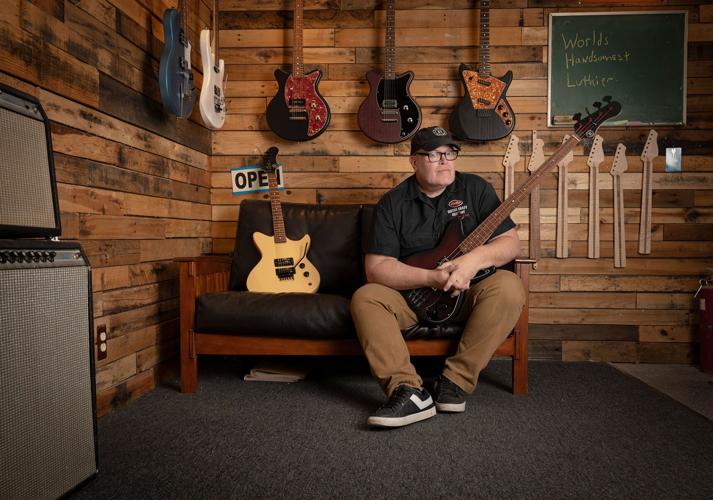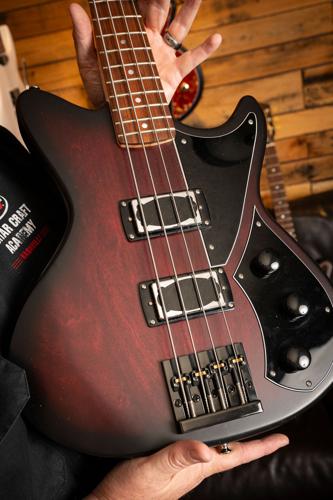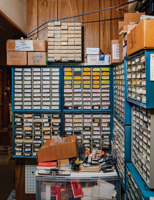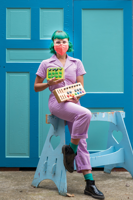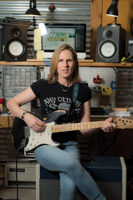
K. Butler Guitars' Kelly Butler
In our occasional series we call Gearing Up, we profile some of the people around town who make, repair or sell the instruments and other equipment that musicians use.
Kelly Butler, the visionary luthier behind K. Butler Guitars, does not necessarily consider his precision-crafted electric guitars works of art.
“I’ve seen a lot of guitars that were really done up in a way to be artistic,” Butler says. “For me, though, I want my guitars to be looked at as tools. I want them to be the tool through which a musician expresses himself. I want my guitars to be played. I want them to be beat to death and sweated on every night. I want them to be dirty. I want them to stink when you pull them out of the case [the next day].”
Spoken like a true working musician, which Butler was in a former life. From the mid-’80s to the mid-’90s, Butler was on the cutting edge of the fusion of hard rock and rap as a founding member of three Nashville bands who were pioneers in that hybrid genre: Mr. Zero, The Hard Corps and Stone Deep. But by the summer of 1994, he realized he no longer wanted to be a bass player in a band, and departed Stone Deep in July of that year. He admits he floundered for a while before answering an ad for an entry-level position in the Gibson Custom Shop.
“I interviewed and got the job, surprisingly,” he says. “And within a week or so of being there, I was like, ‘Oh, OK, this is it. This is where I fit in.’”
Not long after he joined Gibson in December 1995, he realized a smaller division within the Custom Shop called the Pro Shop was where the real action was.
“I’d see these four or five guys kind of doing all this cool stuff — all the prototyping and working on artists’ guitars and stuff like that,” Butler says. “And I’m like, ‘How can I be down with those guys?’ So I started talking to them, and it turns out they had all gone to school to learn the craft.”
So approximately a year into working at the Gibson Custom Shop, Butler requested a leave of absence to attend the Roberto-Venn School of Luthiery in Phoenix, with the understanding that he would join the Pro Shop upon his return.
“It’s a six-month intensive course,” he explains. “You learn electric building, and you learn acoustic building. It’s an intense eight hours a day, five days a week.”
After he returned to Nashville, Butler spent around six years working in the Gibson Pro Shop. Then in 2002, First Act, a Boston-based company that made beginner electric guitars, hired Butler to launch a pro division.
“The owners of that company wanted to attempt to lend some credibility to the brand name by bringing someone on board who could make pro-level instruments in house,” he recalls. “First day on the job, they handed me a key to the building and a company credit card, and they said, ‘Go make guitars.’”
Butler hired a couple of his former colleagues from the Gibson Custom Shop to staff his shop at First Act. Within a few years, more than 100 touring guitarists were playing First Act guitars from their division.
“For several years there, almost every band on Warped Tour had at least one First Act guitar in their collection,” he says.
Although he describes his time in Boston with First Act as “a great opportunity and a great experience,” Butler and his wife were feeling the pull of Tennessee.
“We had started our family, and we really just wanted to get back to Middle Tennessee so that our kids could grow up around their aunts and uncles and cousins and grandparents,” he explains.
So in 2008, he and his family returned to the Nashville area. He pursued other lines of work until 2017, at which time he took two giant steps back into the world of guitar making. He joined the faculty at Musicians Institute Guitar Craft Academy in Nashville, where he teaches electric guitar building, and he launched K. Butler Guitars.

K. Butler Guitars' The Shark bass
Six years later, K. Butler Guitars has two fabrication shops in the Nashville area and offers three different models of electric guitars and an electric bass that range from $1,800 to $3,500 in price, depending on the model and trim. The round-edged ’64 is typically outfitted with a single pickup, though Butler has made “V2” two-pickup versions. Meanwhile, The Shark’s more angular body style comes with a pair of single-coil pickups, a pair of humbuckers or a mixed set of the two. There’s also a bass version of The Shark, which Butler describes as a true rock bass. The MSPP-5 is the signature guitar of Nashville metal legend Mike Simmons and has a full-size humbucker in the bridge position and a bladed, single-coil-sized humbucker at the neck.
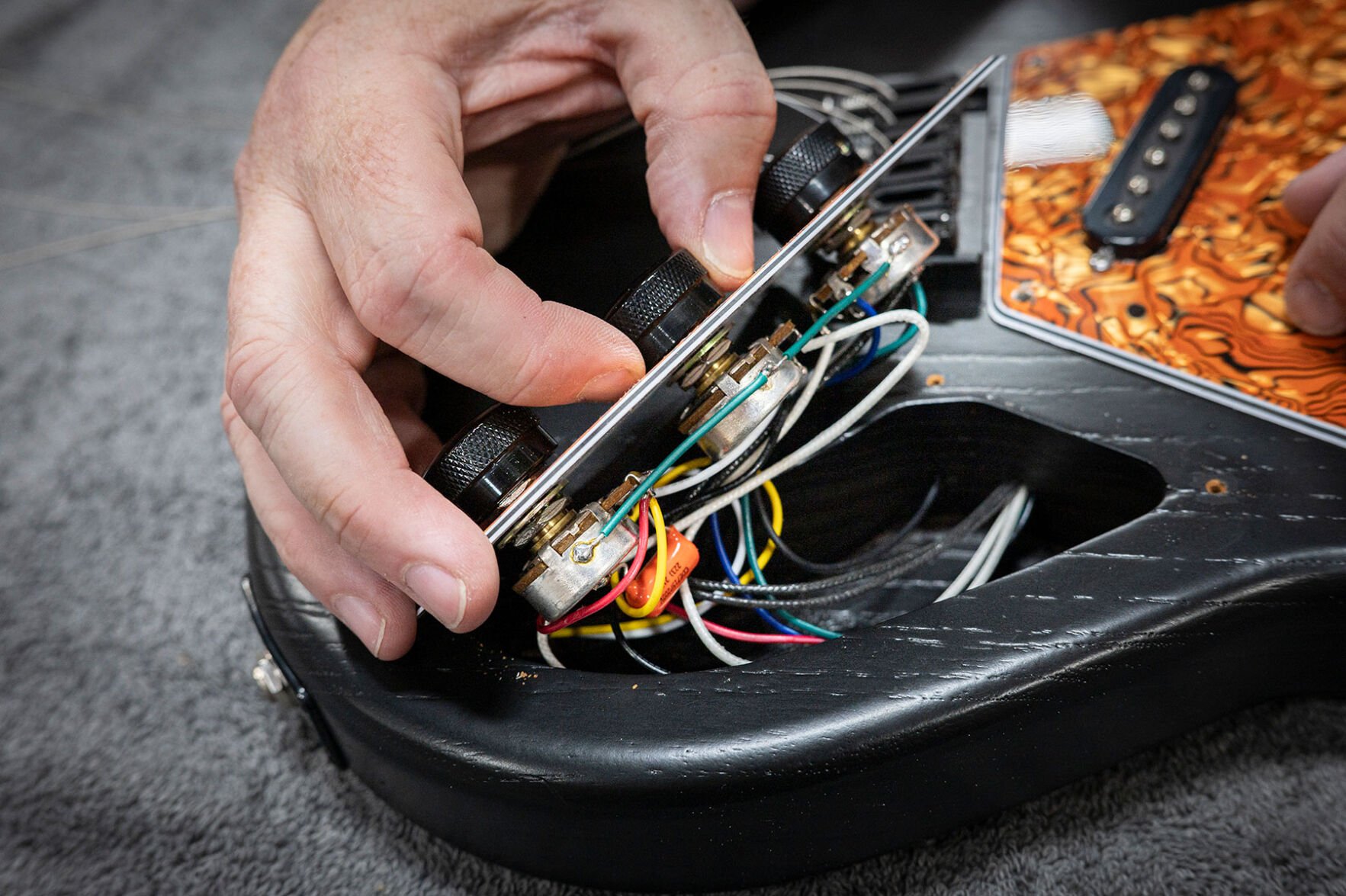
K. Butler Guitars' Kelly Butler shows the wiring inside a The Shark model guitar
“Kelly’s body designs are totally original,” says Simmons, who is best known as the leader of the band Simmonz. “Which is pretty amazing, because you would think that every fucking guitar shape that you could imagine has been made.”
Simmons likes the way the MSPP-5 feels in his hands — importantly, it’s not too heavy. Producer, arranger and multi-instrumentalist John Mark Painter likes the same thing about The Shark models he plays.
“When I first played his guitars, I was like, ‘Oh, man, this is it,’” says Painter, who also owns a Shark Bass.
Butler Guitars are sold locally at Caldwell Guitars in East Nashville, but a lot of the company’s business comes via word of mouth. More than one player has purchased guitars from K. Butler after recording with Painter.
“They were like, ‘What is that? I need one of those,’” Painter recalls. “You just can tell it wasn’t made in a factory.”

